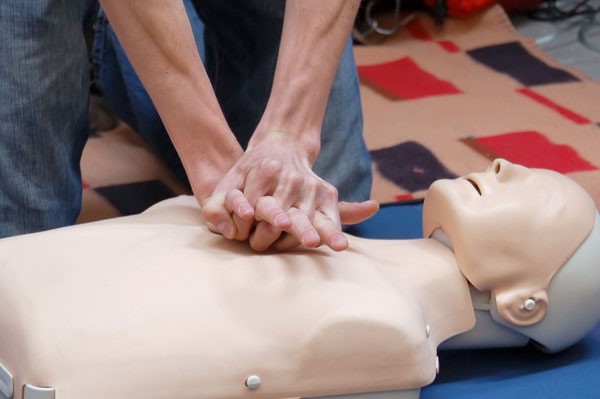Why should you take a Standard First Aid Course?
Many people respond with the fact that it is mandatory for a job or it looks good on a resume. Despite this being the most common response, most people don’t realize that participating in a first aid course not only trains you how to properly respond to emergencies but it also trains you to become a leader and perhaps one day save a life.
Recently, Clayton Blackwood of Toronto decided to take charge and help save the life of a 30-year-old woman who was struck by a van:
He was cycling down Annette Street that afternoon when he saw the woman try to cross the road. The van’s driver was attempting to make a left turn when he slammed into her.
“I saw her lying there and she was very seriously injured,” he recalls. He dropped his bike and rushed to help her. An ambulance was on its way, but Blackwood knew she might die without immediate help.
Lessons learned from a two-week first aid course came storming back into his mind, and he put his basic knowledge into action. He supported her head and monitored her breathing.
[CBC News, Toronto]
For the full CBC News story, click here.
These stories are not uncommon. You have most likely heard of CPR/First Aid training helping victims and at times, saving lives.
There are countries in the world where CPR/first aid training are mandatory to learn, not for the sake of a job, but to ensure most people are prepared for respond to emergency situations which can occur in everyday life. Could you use this training in your everyday life? Certainly. Whether you’re a mother, father, brother, sister, aunt or uncle, etc. your family could use your help one day, the same goes for your colleagues or even a stranger.
The following are common CPR/first aid certification courses you can take:
Covers adult CPR and choking procedures including knowledge and use of an AED (automatic external defibrillator). Also incorporates heart attacks, cardiac arrest, stroke & TIA.
Approximate time of course: 4 hours
Covers adult, child & infant CPR and choking procedures including knowledge and use of an AED (automatic external defibrillator). Also incorporates heart attacks, cardiac arrest, stroke & TIA.
Approximate time of course: 6 hours
Covers all aspects of CPR skills and theory for adult, child and infant victims, including rescue breathing and the use of an AED and bag-valve-mask (BVM). This HCP level is designed specifically for those who, as part of their job descriptions as Health Care Providers, have a duty to respond to medical emergencies (e.g. doctors, nurses, paramedics and allied health care professionals).
Approximate time of course: 6 hours
For people who want a general knowledge of first aid principles and the emergency treatment of injuries. Skills incorporate CPR-C material as well as victim assessment, respiratory emergencies, such as choking, asthma and hyperventilation, and wound care, such as bleeding and burns.
Approximate time of course: 6 hours
Comprehensive training covering all aspects of first aid and CPR. Skills incorporate Emergency First Aid material as well as head & spinal injuries, bone/joint/muscle injuries, environmental emergencies such as hypo/hyperthermia (heat stroke) poisoning as well as sudden medical emergencies such as seizures, diabetes & anaphylaxis.
Approximate time of course: 16 hours (over two days)
Public vs. Private Courses
Public courses are pre-scheduled courses that allow anyone to sign up for. Many organizations offer public courses and post their schedule on their website. Other public courses can be found at your local community centre, especially those with a pool.
Private courses are courses run for private groups which can be run at a location and time of the clients choosing. Most organizations typically require a minimum number of participants to run a private course.
Why take a private course?
By taking a private course it enables the instructor to design common scenarios around an environment of your choosing. Whether at your place of work or at home, running a private course will provide the most practical training as it will enable you to practice scenarios you are most likely to be face with.
First Aid Canada offers private onsite courses only. Whether during the week or weekend, we come to a location of your choice at a time that is most convenient for you.
If you have any question regarding CPR/first aid training, we are always here to help, feel free to contact us today.

